Capcom wanted to do more with Monster Hunter: World and "didn't give up" on those ideas – now "Monster Hunter Wilds made it possible" to try again
Interview | How Capcom used Monster Hunter Wilds to step up its tech
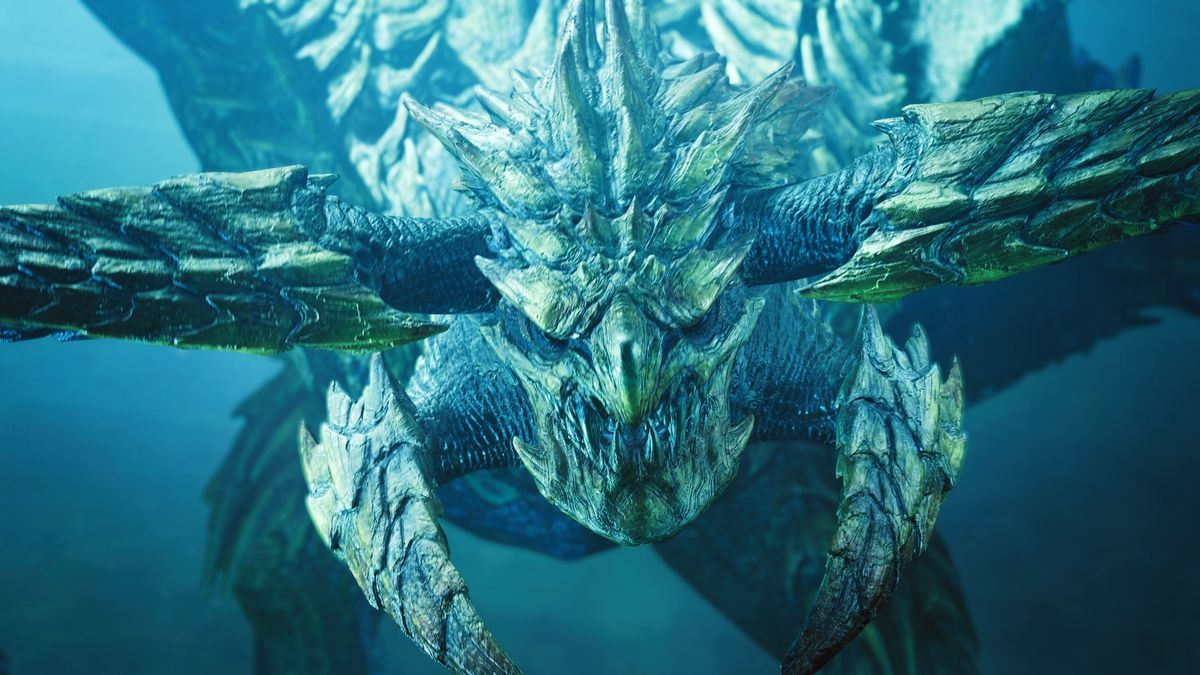
After the five-hour hands-on session that fueled my Monster Hunter Wilds preview, I followed Capcom staff for a tour of the studio's Osaka, Japan headquarters. As we explored the facilities behind the motion capture, music recording, and sound recording for more than just Monster Hunter Wilds, a theme of evolution began to emerge. Actors in tight mocap suits miming Palicoes with uncanny accuracy also began to emerge, but anyway, back to the theme.
'This was improved,' 'that was added in,' 'we got the equipment for this,' and so on. Development had, on a foundational level, changed. Above all else, a quote from Monster Hunter series producer Ryozo Tsujimo – who I'd spoken to (via interpreter) in a group interview earlier that day along with art and executive director Kaname Fujioka and Wilds game director Yuya Tokuda – was stuck in my mind: "Monster Hunter Wilds made it possible."
Exploring the forbidden lands
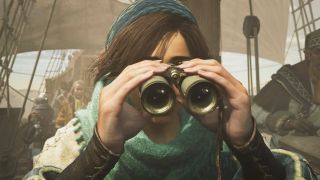
Monster Hunter Wilds is poised to be one of the biggest new games of 2025 and the biggest Monster Hunter ever made. This series of combat-and-crafting action RPGs was too good to stay niche forever, so it was in a sense unsurprising to see Monster Hunter: World achieve massive global popularity. But the scale of its success is hard to overstate. World alone represents over 25% of the total sales for this 20-year series. Monster Hunter Rise helped preserve that momentum, but it's Monster Hunter Wilds, with its overtly World-like look and feel, wholly distinct from the brighter and more animated style of the initially Switch-exclusive Rise, that's truly following it up.
We're making Monster Hunter Wilds a global title
Ryozo Tsujimoto
Monster Hunter: World was an unprecedented spike, and for a while Capcom was rushing to figure out how to accommodate and appeal to its massively expanded audience. Monster Hunter Wilds is the answer. Previously, Tsujimoto commented on the things you have to have in place to make and maintain a "global level hit," a game of a caliber that Monster Hunter just had not been before. In a small white meeting room in Osaka, where we spoke alongside two other journalists, I put the question to him again: does Capcom have those things in place now?
"We're making Monster Hunter Wilds a global title," Tsujimoto begins. "Some of the things that we couldn't do in Monster Hunter: World and we didn't want to give up on, we've really implemented those into Monster Hunter Wilds. We feel like Monster Hunter Wilds made it possible. We were happy to be able to do the [open beta test] in the timing last month to see what we need to work on in order to have this game successfully launch for the [final] version. We're obviously still working on it, still making adjustments to deliver the best experience to users, and we're confident that Monster Hunter Wilds is able to deliver that to everybody."
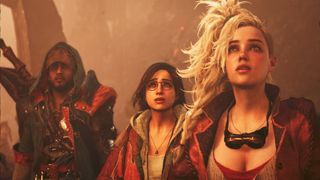
Tokuda touches on specific improvements made post-beta. Some were already planned and couldn't make it into the build – separately, a Capcom staffer told me that they were expecting a certain degree of criticism given the rough and dated state of the beta build – and some are based on what beta players have been saying. A few weapons are due for big changes, for example, and some ornery bugs were squashed. Hitstop is back in force. In response to another question, Tsujimoto discussed higher-level changes that were made in and for development.
"Monster Hunter became globally popular and very big starting from Monster Hunter: World," he says. "And when Monster Hunter: World's development started to calm down, that is when we began the development for Monster Hunter Wilds. It was around the same time of the year, right now, and what we felt that we needed to do was, first off, the engine that Monster Hunter: World was working on was a customized version of the MT Framework game engine, and we needed to change that to RE Engine. And there were a lot of new things that we wanted to do technically because of the advancement in technology. So we wanted to create a new way of depicting the world of Monster Hunter and we wanted to find a way that really incorporated the advancement that game was able to do for Monster Hunter Wilds."
Sign up to the 12DOVE Newsletter
Weekly digests, tales from the communities you love, and more
Don't you dare sing a whole new World
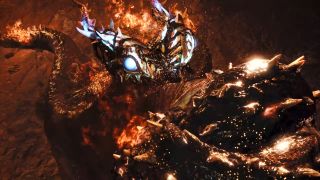
I heard earlier this year, and have now seen firsthand, how Wilds seeks to build on the seamlessness of World and dive deeper into organic and naturalistic themes. Tsujimoto points to whole herds and packs of monsters working and moving together, a quest system woven into locales rather than offset in menus, and smarter AI. On a technical level, monster body types are more diverse, with newcomers like the cephalopodic Black Flame taking an axe – eight axes, even – to the quadruped wyvern template. We have never seen monsters like this in Monster Hunter because they simply couldn't be animated before.
Monster Hunter is not truly ever over
Ryozo Tsujimoto
Wilds' overall structure seems the most RPG-like that Monster Hunter has ever been. This doesn't strike me as a coincidence as Capcom seeks to grab more people than ever. The story, too, clearly has more to say. Wilds brings us to forbidden lands to investigate a monster that was thought to be extinct until a boy from a previously unknown tribe saw it wreck his village. Even in the opening hours, our interactions with the people of these lands totally eclipse the standard Monster Hunter formula of a bunch of researchers researching research in the name of research, occasionally doing favors for the locals along the way.
"Coexisting in the same world and having nature and people living together is a big focus of Monster Hunter," Fujioka adds, "Especially for Monster Hunter: World, the ecology of monsters was a big focus, where we have vegetation, plants, small and large monsters, and also endemic life. Nature was a very big focus. For Monster Hunter Wilds, we want to see how humans obviously played a big role in the ecology, and within that ecology, how do people live in that world? How do they act? What did they do? That was a big focus we [wanted] to highlight."
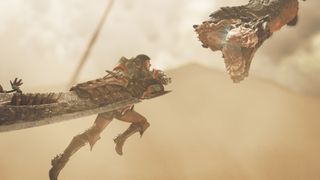
Another Capcom staffer explained that, now more than ever, they've made an extra effort to convey what's fun about Monster Hunter and consider how to make it all understandable, to help players break through the series' notorious wall of techniques and items and menus. So far, it seems to be working. Where an alarming number of Monster Hunter: World players apparently dropped the game before even beating the beginner punching bag Great Jagras, data from the Wilds beta suggests more people are sticking with it and playing through the core content.
World: But More is my current read of Wilds. In all the years I've played Monster Hunter – only starting with 4 Ultimate, admittedly – I've never seen two entries with such clear and intentional overlap. And if that's all Wilds is, honestly, I'll be perfectly happy. But it does feel like more than more, too. Just as there have been fundamental changes at Capcom, my time with Wilds suggests there's been a change in kind since the release of World and Rise. To the folks holding the reins of the series, however, some things will and should never change.
"Monster Hunter is not truly ever over," Tsujimoto concludes. "We always want people to play for a very long time, and that has been a focus for all the titles that we had in the past. And it's obviously something that Monster Hunter Wilds has in mind as well."
Our ever-growing Big Preview: Monster Hunter Wilds hub has all the interviews, hands-on impressions, and key details you'll want and need for this enormous game.

Austin has been a game journalist for 12 years, having freelanced for the likes of PC Gamer, Eurogamer, IGN, Sports Illustrated, and more while finishing his journalism degree. He's been with 12DOVE since 2019. They've yet to realize his position is a cover for his career-spanning Destiny column, and he's kept the ruse going with a lot of news and the occasional feature, all while playing as many roguelikes as possible.
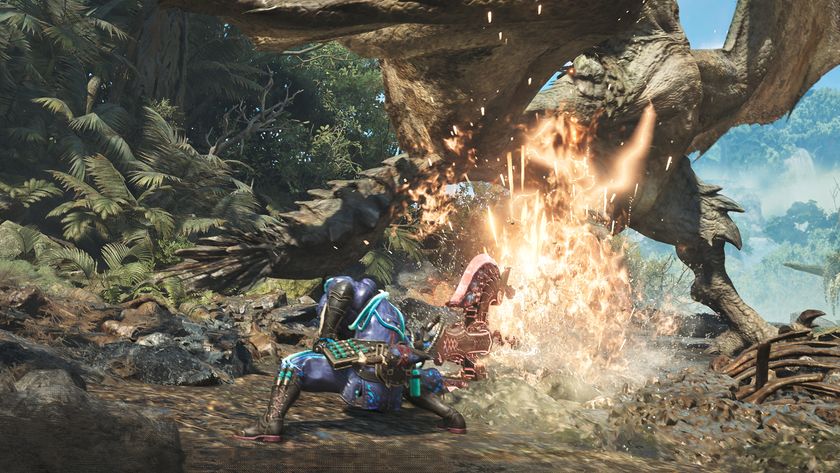
"There shouldn't just be one weapon to slay them all": Monster Hunter Wilds' director will put up with my hammer bro shenanigans, but wants players to have options
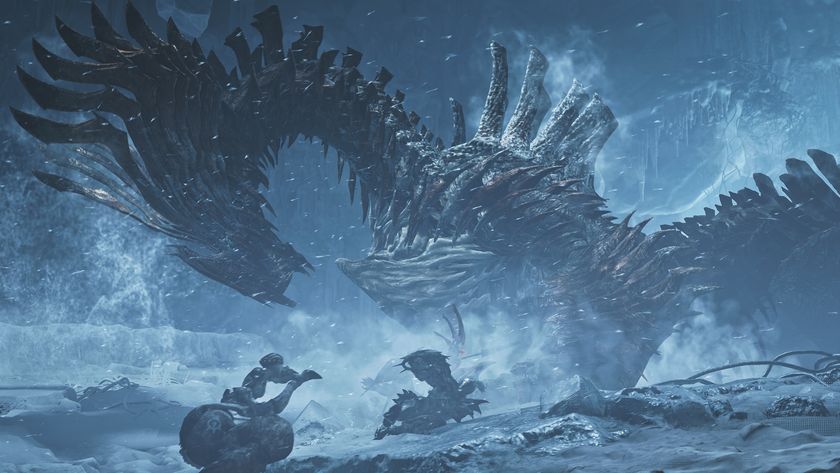
With Monster Hunter Wilds poised to pop off this year, the series' veteran devs have one piece of advice for new players: "Don't rush it"
Most Popular





